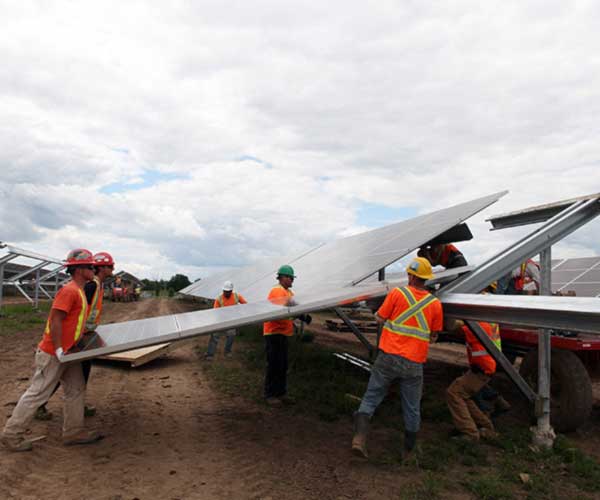As the world transitions towards a clean energy future, there will be a great need to address the challenges of transitioning oil, coal and gas workers towards renewable energy jobs.
When the Alberta oil sands slowdown hit in 2015, workers were left feeling the brunt, and while the exploration industry is recovering, many of the jobs are likely to be lost to increased automation. Also, Canada’s commitments to the Paris Climate accord does not help as this changes the dynamics of employment in the fossil fuel industry.
The solar industry is a viable choice and offers the best chance at employment for oil workers who are looking for re-employment in a field where their skills can be easily transferable.
Numerous organizations are spearheading efforts and advocating for oil patch workers to transition towards a clean energy economy. One of such organizations is Iron and Earth, created in 2015, it is an organization lead by oil sands workers who believe in increasing renewable energy projects as a source of employment.
When oil prices fell, it became apparent that there needs to be greater dialogue between fossil fuel workers and those within the renewable energy sector with the aim of transitioning towards a more environmentally sustainable energy mix.
In October 2017, Iron and Earth put on a five-day solar skills course in Maskwacis, Alberta for the Louis Bull Tribe. Fifteen participants learned rooftop solar installation skills in the first class of the “Solar Skills” upgrading program.
Iron and Earth hopes to train 1,000 coal, oil and gas workers including those within Aboriginal communities to become solar technicians. Its Communications Director, Jen Turner said “energy workers have skills which are transferable and versatile but need support for them to diversify into the market.”

ARCHIVE /Workers install a solar panel at the SunEdison Newboro 1 Solar Project /Dave Chan for The Globe and Mail
Louis Bull Councillor Desmond Bull told Global News “participants who completed the training have a fantastic opportunity with the new skills gained while networking with others to explore new employment channels.”
Mr. Bull adds that “hundreds of workers have already signed the Solar Skills pledge, calling on the government to invest in worker upskilling. We hope they listen, and that more Canadians will realize what’s possible with training programs like these.”
Turner stressed on the need to retrain oil-sand workers as a crucial component to be competitive in the clean energy economy. Last year, Iron and Earth released a report calling on the need for apprenticeships, interim training while upgrading their facilities in building renewable energy manufacturing capacity.
A Siemens Canada analyst projects that by 2030, $50 billion will be invested in renewable energy projects within Saskatchewan and Alberta.
Across the border, in the U.S., training programs for oil, coal, and gas workers, also exist, especially in states like Colorado. Solar Energy International operates training programs which help workers in Colorado transition towards solar employment.
Many of these training programs take place in communities hard hit by coal shutdowns, as the U.S., solar industry accelerates.
“The trick has been to avoid political rhetoric sometimes found between pro-fossil fuel and pro-renewable energy sectors over climate change. The trick is to find some common ground in these communities,” says Chris Turek, Director of Marketing and Communications at Solar Energy International
Mr. Turek adds that they avoid the political debate within the classroom while acknowledging solar energy technology works and is becoming cheaper.
“We can’t decarbonize the economy, which is still massively fossil fuel-based, without changing the labor market,” said Benjamin Denis, the European Trade Union Confederation policy advisor.
In the future, encouraging more training for those affected by potential layoffs within the fossil fuel industry is necessary. It’s important to support oil patch workers affected most by this disruption, and to ensure that they have an equal opportunity to enjoy the clean energy boom.














Comments